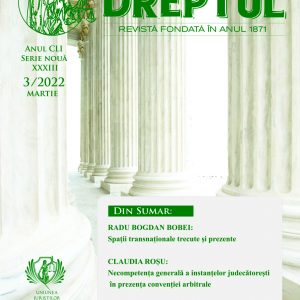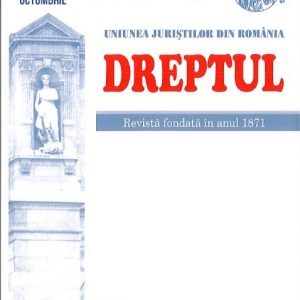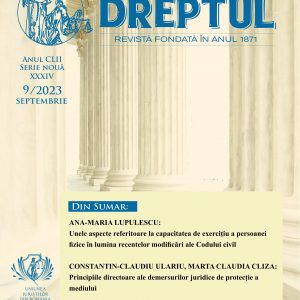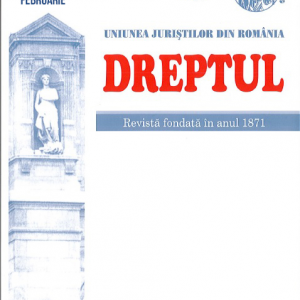-
 În prezent, de peste un deceniu, problematica organizării și exercitării profesiei de consilier juridic, precum și a statutului acestei profesii este reglementată prin trei acte normative, și anume: – Legea nr. 514/2003 privind organizarea și exercitarea profesiei de consilier juridic1; – Statutul profesiei de consilier juridic2 (în continuare, Statutul – n.n.); – Regulamentul privind recunoașterea calificării profesionale de consilier juridic a cetățenilor statelor membre ale Uniunii Europene sau aparținând Spațiului Economic European, în vederea admiterii și practicării acesteia în România3
În prezent, de peste un deceniu, problematica organizării și exercitării profesiei de consilier juridic, precum și a statutului acestei profesii este reglementată prin trei acte normative, și anume: – Legea nr. 514/2003 privind organizarea și exercitarea profesiei de consilier juridic1; – Statutul profesiei de consilier juridic2 (în continuare, Statutul – n.n.); – Regulamentul privind recunoașterea calificării profesionale de consilier juridic a cetățenilor statelor membre ale Uniunii Europene sau aparținând Spațiului Economic European, în vederea admiterii și practicării acesteia în România3 -
 According to Article 41 (1) of the Criminal Code, if the offender convicted by a final judgment is subsequently tried for a concurrent offence, the previously established punishment, under the conditions of concurrence of offences, shall be separated, the increase shall be removed and it shall be merged with the newly applied punishment, adding a new increase. In compliance with Article 10 of the Law No 187/2012, when at least one of the offences in the structure of plurality has been committed under the new law, the sanctioning treatment of plurality shall be applied according to the new law, even if for the other offences the punishment was established according to the former, more favourable law. This legal provision comes in conflict with the principle of non-retroactivity of the criminal law.
According to Article 41 (1) of the Criminal Code, if the offender convicted by a final judgment is subsequently tried for a concurrent offence, the previously established punishment, under the conditions of concurrence of offences, shall be separated, the increase shall be removed and it shall be merged with the newly applied punishment, adding a new increase. In compliance with Article 10 of the Law No 187/2012, when at least one of the offences in the structure of plurality has been committed under the new law, the sanctioning treatment of plurality shall be applied according to the new law, even if for the other offences the punishment was established according to the former, more favourable law. This legal provision comes in conflict with the principle of non-retroactivity of the criminal law. -
 Under current Romanian law (via multiple enactments), authorized translators and interpreters (who translate legal documents of any kind), have no legal knowledge in practice frequently, but philological only (for the foreign language they are duly authorized), whereas Romanian legislation in the field (quite bushy) does not provide for the authorized translator / interpreter a law school graduation as a condition sine qua non. Hence, there are a number of serious complications in practice. Such being the case, the author suggests that those who shall be authorized as translators / interpreters (of legal documents or to legal effects), either hold a degree in law (LLB) or at least having completed relevant specialized courses (possibly at the Romanian Notary Institute).
Under current Romanian law (via multiple enactments), authorized translators and interpreters (who translate legal documents of any kind), have no legal knowledge in practice frequently, but philological only (for the foreign language they are duly authorized), whereas Romanian legislation in the field (quite bushy) does not provide for the authorized translator / interpreter a law school graduation as a condition sine qua non. Hence, there are a number of serious complications in practice. Such being the case, the author suggests that those who shall be authorized as translators / interpreters (of legal documents or to legal effects), either hold a degree in law (LLB) or at least having completed relevant specialized courses (possibly at the Romanian Notary Institute). -
 In the above study, the author often criticizes the constant case law of the Constitutional Court of Romania, namely the fact that, on the one hand, the resolution by this Court of an exception of non-constitutionality a posteriori (therefore, after the law or the Government ordinance was adopted and published) is no longer legally possible if, as at the date of the Constitutional Court decision, the law/Government ordinance is no longer in force, being expressly abrogated. Moreover, the Constitutional Court also stated that, in the given situation, the examination of the non-constitutionality of the law shall be made by the courts, no matter their type (therefore, not by the Constitutional Court as well). Proving with arguments that the solution passed by the Constitutional Court is legally wrong, the author also emphasizes the serious consequences of the Constitutional law case law (the perpetuation ad infinitum in the future of the effects of a law, Government ordinance, hypothetically unconstitutional).
In the above study, the author often criticizes the constant case law of the Constitutional Court of Romania, namely the fact that, on the one hand, the resolution by this Court of an exception of non-constitutionality a posteriori (therefore, after the law or the Government ordinance was adopted and published) is no longer legally possible if, as at the date of the Constitutional Court decision, the law/Government ordinance is no longer in force, being expressly abrogated. Moreover, the Constitutional Court also stated that, in the given situation, the examination of the non-constitutionality of the law shall be made by the courts, no matter their type (therefore, not by the Constitutional Court as well). Proving with arguments that the solution passed by the Constitutional Court is legally wrong, the author also emphasizes the serious consequences of the Constitutional law case law (the perpetuation ad infinitum in the future of the effects of a law, Government ordinance, hypothetically unconstitutional). -
 On 4 June 2020, Romania marks the Centenary from the signing of the Peace Treaty of Trianon. An essential page of the history of the Romanian nation, which took the form of a peace treaty concluded by the Allied and Associated Powers, including Romania, with Hungary, as the successor state of the Austro-Hungarian Empire, a state defeated in the World War I. By the content of this peace treaty, the Great Powers recognized the Union of Transylvania (and of the Eastern part of Banat) with Romania, respectively the sovereign will of the Transylvanian Romanians expressed by means of plebiscite on 1 December 1918 and, respectively, the Resolution of the National Assembly from Alba Iulia. The Treaty of Trianon has enshrined the realization of the right to self-determination of the nations of the Austro-Hungarian dualist monarchy. For Romania, the mentioned Peace Treaty meant not only the international legal recognition of the Union of Transylvania with the Motherland, but also the confirmation of the political and civil rights of the Romanians who constituted the majority population in this territory.
On 4 June 2020, Romania marks the Centenary from the signing of the Peace Treaty of Trianon. An essential page of the history of the Romanian nation, which took the form of a peace treaty concluded by the Allied and Associated Powers, including Romania, with Hungary, as the successor state of the Austro-Hungarian Empire, a state defeated in the World War I. By the content of this peace treaty, the Great Powers recognized the Union of Transylvania (and of the Eastern part of Banat) with Romania, respectively the sovereign will of the Transylvanian Romanians expressed by means of plebiscite on 1 December 1918 and, respectively, the Resolution of the National Assembly from Alba Iulia. The Treaty of Trianon has enshrined the realization of the right to self-determination of the nations of the Austro-Hungarian dualist monarchy. For Romania, the mentioned Peace Treaty meant not only the international legal recognition of the Union of Transylvania with the Motherland, but also the confirmation of the political and civil rights of the Romanians who constituted the majority population in this territory. -
 The article analyses the main changes brought to the Constitution by the bill currently under parliamentary debate. The conclusion is that the bill represents a failure from many perspectives: transparency and public debate that must accompany such an important project; dialogue between the power and the opposition in the Parliament; ignorance for the result of a national referendum and, last but not least, the faulty wording of the text. Normally, if a Constitution revision is desired, the parliamentary majority should start negotiations with other parliamentary parties with the purpose of forming a Constitutional Convention which is to draft a new bill. If the parliamentary debate continues on the current bill declared, almost entirely, by the Constitutional Court as not respecting the revision limits and a new referendum will be organized for the approval of the bill, this bill has all chances to fail. A new revision bill should be drafted after a long political debate in which citizens must understand the necessity of the revision. Also, a new bill should consider the interests of the citizens and not interests of those in power.
The article analyses the main changes brought to the Constitution by the bill currently under parliamentary debate. The conclusion is that the bill represents a failure from many perspectives: transparency and public debate that must accompany such an important project; dialogue between the power and the opposition in the Parliament; ignorance for the result of a national referendum and, last but not least, the faulty wording of the text. Normally, if a Constitution revision is desired, the parliamentary majority should start negotiations with other parliamentary parties with the purpose of forming a Constitutional Convention which is to draft a new bill. If the parliamentary debate continues on the current bill declared, almost entirely, by the Constitutional Court as not respecting the revision limits and a new referendum will be organized for the approval of the bill, this bill has all chances to fail. A new revision bill should be drafted after a long political debate in which citizens must understand the necessity of the revision. Also, a new bill should consider the interests of the citizens and not interests of those in power. -
 In the presence of an arbitration agreement, the parties remove the general competence of the common law court for any possible disputes that may arise between them. In this article, the author starts from a case settled in the judicial practice. In the present case, although the arbitration agreement was inserted in the contract of the parties, the applicant nevertheless referred the matter to the court of law. In this situation, before the Cluj-Napoca Court of first instance, the defendant wrongly invoked the plea of territorial lack of competence. The court referred with the matter perpetuated the error and admitted the plea, although it should have qualified it as being the plea of general lack of competence of the court of law. The Cluj-Napoca Court of first instance declined the settlement of the case to Oradea Court of first instance, which took the correct measure and declined the settlement of the case to the Arbitration Court attached to the Timiș Chamber of Commerce, Industry and Agriculture. In our opinion, since the parties have established by their will the competence of the arbitral court for any possible disputes between them, they should respect this aspect and should not refer the matter to the courts of law.
In the presence of an arbitration agreement, the parties remove the general competence of the common law court for any possible disputes that may arise between them. In this article, the author starts from a case settled in the judicial practice. In the present case, although the arbitration agreement was inserted in the contract of the parties, the applicant nevertheless referred the matter to the court of law. In this situation, before the Cluj-Napoca Court of first instance, the defendant wrongly invoked the plea of territorial lack of competence. The court referred with the matter perpetuated the error and admitted the plea, although it should have qualified it as being the plea of general lack of competence of the court of law. The Cluj-Napoca Court of first instance declined the settlement of the case to Oradea Court of first instance, which took the correct measure and declined the settlement of the case to the Arbitration Court attached to the Timiș Chamber of Commerce, Industry and Agriculture. In our opinion, since the parties have established by their will the competence of the arbitral court for any possible disputes between them, they should respect this aspect and should not refer the matter to the courts of law. -
 The new normative framework established in matters of public procurement, of sectoral procurement and of concessions, was required in considering the necessity to transpose the three European directives of 2014 into our domestic law. In addition to the three normative acts, it has been adopted a special normative act that regulates the remedies and the means of appeal in the matter of the procedure of award of the public procurement contracts, of the sectoral contracts and of the works concession and services concession contracts. In the ambience of the new normative framework thus established, this study intends to make a detailed analysis concerning the settlement by administrativejurisdictional means of the disputes derived from the procedure of award of these contracts, as well as the means of appeal that may be exercised against the decision of the body vested with administrative-jurisdictional powers.
The new normative framework established in matters of public procurement, of sectoral procurement and of concessions, was required in considering the necessity to transpose the three European directives of 2014 into our domestic law. In addition to the three normative acts, it has been adopted a special normative act that regulates the remedies and the means of appeal in the matter of the procedure of award of the public procurement contracts, of the sectoral contracts and of the works concession and services concession contracts. In the ambience of the new normative framework thus established, this study intends to make a detailed analysis concerning the settlement by administrativejurisdictional means of the disputes derived from the procedure of award of these contracts, as well as the means of appeal that may be exercised against the decision of the body vested with administrative-jurisdictional powers. -

-
 In this study, the author proves that the adoption of 5 resolutions of the Government of Romania, during 2005-2010, regulating the operation of deconcentrated public services, organized at regional level (each including many counties) is unconstitutional in relation to the provisions of art. 120 and 123 of the Constitution of Romania (revised and republished), since, according to these constitutional rules, the deconcentration of public administration can be done only at the level of counties or the Bucharest municipality, and the prefect (appointed in each country and in the Bucharest municipality) is the representative of the Government at local level, having – among other things – the competence to manage the deconcentrated public services of the ministries and of the other specialized central administration bodies in the administrativeterritorial units.
In this study, the author proves that the adoption of 5 resolutions of the Government of Romania, during 2005-2010, regulating the operation of deconcentrated public services, organized at regional level (each including many counties) is unconstitutional in relation to the provisions of art. 120 and 123 of the Constitution of Romania (revised and republished), since, according to these constitutional rules, the deconcentration of public administration can be done only at the level of counties or the Bucharest municipality, and the prefect (appointed in each country and in the Bucharest municipality) is the representative of the Government at local level, having – among other things – the competence to manage the deconcentrated public services of the ministries and of the other specialized central administration bodies in the administrativeterritorial units. -
 The present analysis was carried out in order to clarify the situation in which the heads of claim do not have a clear and justified correspondent with the arguments presented in the statement of claim, as well as possible procedural solutions which can resolve such an issue. From the sources analyzed so far, it appears that there is no straight forward solution for this situation neither in the legal provisions, case law or speciality lectures. The premise of our study consists in the situation in which a claimant submits a request containing only one head of claim, although the content of the statement of claim includes also arguments and grounds which are not related to the one and only head of claim which was mentioned in the application, because they refer to different legal topics which are not properly expressed at the beginning of the statement of claim, as head of claim. The present analysis concerns the issues arising from the above mentioned situation both for the claimant and defendant, but also which are the remedies at their hand if such situations will occur. In addition to this, the study presents also the remedies available from the courts’ perspective if such a situation appears in different phases of the trial, but also the consequences of this situation if the issue is not addressed properly by the parties or by the court before the issuance of the court ruling.
The present analysis was carried out in order to clarify the situation in which the heads of claim do not have a clear and justified correspondent with the arguments presented in the statement of claim, as well as possible procedural solutions which can resolve such an issue. From the sources analyzed so far, it appears that there is no straight forward solution for this situation neither in the legal provisions, case law or speciality lectures. The premise of our study consists in the situation in which a claimant submits a request containing only one head of claim, although the content of the statement of claim includes also arguments and grounds which are not related to the one and only head of claim which was mentioned in the application, because they refer to different legal topics which are not properly expressed at the beginning of the statement of claim, as head of claim. The present analysis concerns the issues arising from the above mentioned situation both for the claimant and defendant, but also which are the remedies at their hand if such situations will occur. In addition to this, the study presents also the remedies available from the courts’ perspective if such a situation appears in different phases of the trial, but also the consequences of this situation if the issue is not addressed properly by the parties or by the court before the issuance of the court ruling. -
 The study examines the issue of unlawful interceptions and audio or video recordings made during preliminary acts, i.e. prior to prosecution; this is a common problem the case law courts are often faced with. The conclusion that interceptions and carrying out audio or video recordings prior to the start of a criminal trial are unlawful is produced by the author based on the analysis of the Constitutional Court’s jurisprudence on this matter and of power of res judicata accompanying the Constitutional Court’s judgments which is attached not only to the operative part, but also to the considerations underpinning it.
The study examines the issue of unlawful interceptions and audio or video recordings made during preliminary acts, i.e. prior to prosecution; this is a common problem the case law courts are often faced with. The conclusion that interceptions and carrying out audio or video recordings prior to the start of a criminal trial are unlawful is produced by the author based on the analysis of the Constitutional Court’s jurisprudence on this matter and of power of res judicata accompanying the Constitutional Court’s judgments which is attached not only to the operative part, but also to the considerations underpinning it.
